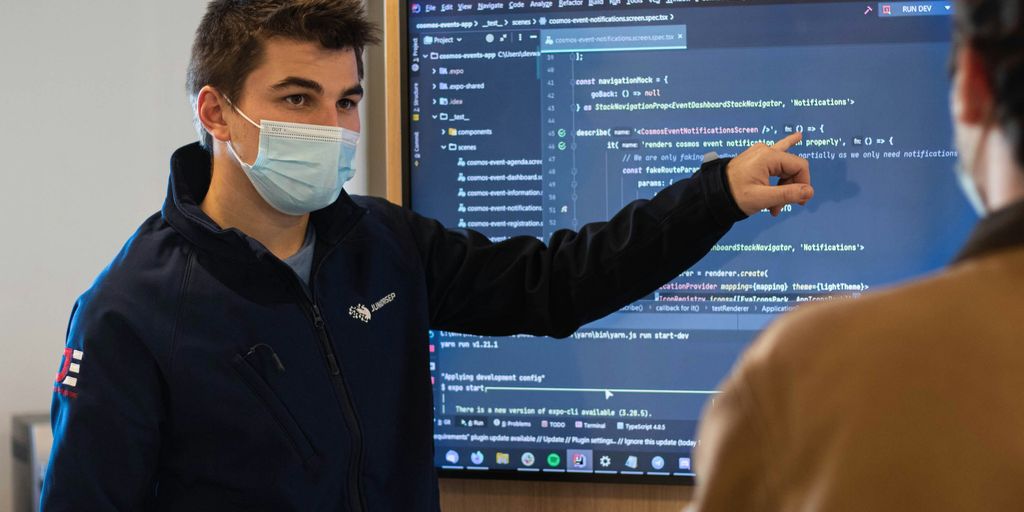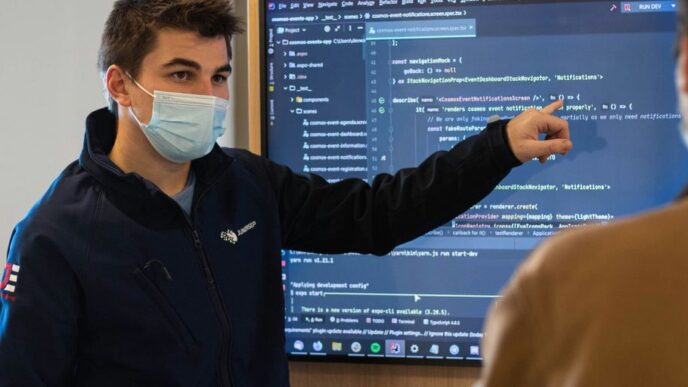Learning to code can feel like a big challenge, but platforms like Geeks for Geeks make it a lot easier. This guide will walk you through how to use Geeks for Geeks practice to get better at coding problems. We’ll cover everything from the basics to getting ready for job interviews.
Key Takeaways
- Using Geeks for Geeks practice helps you learn programming basics.
- The platform has many different types of problems to try.
- A regular practice plan is important for getting better.
- You can use Geeks for Geeks practice to prepare for job interviews.
- Tracking your progress shows you how far you’ve come and what to work on next.
Building a Strong Foundation with Geeks for Geeks Practice

It’s easy to get lost in the weeds of advanced algorithms, but before you start tackling the complex stuff, it’s important to build a solid base. Think of it like building a house – you can’t put up the walls without a strong foundation. When it comes to coding challenges on Geeks for Geeks, this means really understanding the basics. A strong foundation will make the more difficult problems easier to approach.
Understanding Core Programming Concepts
Before you even think about data structures and algorithms, make sure you’re comfortable with the very basics of programming. This includes things like variables, loops, conditional statements (if/else), and functions. If you’re shaky on these concepts, it’s like trying to run before you can walk. Spend some time reviewing these fundamentals. There are tons of resources out there, but basic coding problems are a great place to start. Practice writing simple programs that use these concepts until they become second nature. For example:
- Write a function that calculates the area of a circle.
- Create a loop that prints the numbers from 1 to 10.
- Write an if/else statement that checks if a number is even or odd.
Mastering Data Structures and Algorithms
Okay, now we’re getting to the good stuff. Data structures and algorithms are the building blocks of more complex programs. Data structures are ways of organizing data (like arrays, linked lists, trees, and graphs), and algorithms are step-by-step procedures for solving problems. You don’t need to memorize every single data structure and algorithm, but you should have a good understanding of the most common ones. Start with arrays and linked lists, then move on to trees and graphs. Practice implementing these data structures from scratch, and then use them to solve problems. For example:
- Implement a linked list and write functions to add, delete, and search for elements.
- Use a binary search tree to store and retrieve data efficiently.
- Learn about GeeksforGeeks algorithms and how they work.
Developing Foundational Problem-Solving Skills
Coding challenges aren’t just about knowing the syntax of a programming language or the names of different data structures. They’re about problem-solving. This means being able to break down a complex problem into smaller, more manageable pieces, and then figuring out how to solve each piece. One of the best ways to develop these skills is to practice, practice, practice. Start with easy problems and gradually work your way up to more difficult ones. Don’t be afraid to look at the solutions if you get stuck, but try to understand the solution before you just copy and paste it. And most importantly, don’t give up! The more you practice, the better you’ll become at problem-solving. Here are some tips:
- Read the problem carefully and make sure you understand what it’s asking.
- Break the problem down into smaller steps.
- Write pseudocode before you start coding.
- Test your code thoroughly.
Navigating the Geeks for Geeks Practice Platform
Geeks for Geeks (GFG) is a great place to sharpen your coding skills. But with so much content, it can feel a bit overwhelming at first. Let’s break down how to make the most of the platform.
Exploring Diverse Problem Categories
GFG isn’t just about data structures and algorithms. They’ve got problems sorted into categories like basic programming problems, language-specific challenges (Python, Java, C++), and even interview-focused sets. Spend some time browsing to see what’s available. You might find a category you didn’t even know you needed to work on! It’s a good idea to start with the basics and then move on to more specialized areas as you get more comfortable. Think of it like building blocks – you need a solid foundation before you can build something complex.
Utilizing Detailed Explanations and Solutions
One of the best things about GFG is that most problems come with detailed explanations and solutions. Don’t just copy the code! Really try to understand why the solution works. Read through the explanation carefully, and maybe even try to rewrite the code yourself from scratch. This is where the real learning happens. If you’re stuck, the explanations can be a lifesaver. They often break down the problem into smaller, more manageable steps. Plus, seeing different approaches can broaden your understanding and help you develop your own problem-solving style. Also, you can download GFG course videos for offline learning.
Leveraging the Community for Support
GFG has a pretty active community. If you’re struggling with a problem, don’t be afraid to ask for help! You can find forums and comment sections where people discuss solutions and offer advice. Just make sure you’ve put in some effort yourself before asking for help – people are more likely to help if they see you’ve tried to solve the problem on your own. Also, consider contributing back to the community once you’re more experienced. Sharing your knowledge is a great way to reinforce your own understanding and help others learn. You can also learn from others’ interview experience at top companies.
Strategic Approaches to Geeks for Geeks Practice
Implementing a Consistent Practice Schedule
Okay, so you’re hitting Geeks for Geeks, that’s great! But just showing up isn’t enough. You need a plan. Think of it like this: you wouldn’t try to run a marathon without training, right? Coding is the same. Consistency is absolutely key. Set aside specific times each day or week. Even 30 minutes of focused practice is better than a sporadic three-hour binge. Treat it like an appointment you can’t miss. I find that blocking out time on my calendar helps me stay on track. Experiment to find what works best for you – maybe it’s early mornings, lunch breaks, or evenings. The point is to make it a habit.
Focusing on Targeted Skill Development
Don’t just randomly pick problems. That’s like throwing darts in the dark. Instead, identify your weak areas. Are you struggling with dynamic programming? Maybe graph algorithms are your nemesis? Whatever it is, focus your energy there. Geeks for Geeks has tons of problems categorized by topic. Use that to your advantage. Work through the easier problems first to build a solid understanding, then gradually tackle the harder ones. It’s also a good idea to alternate between different types of problems to keep things interesting and prevent burnout. For example, spend one week on mastering data structures and the next on algorithms.
Analyzing and Learning from Mistakes
Everyone makes mistakes. It’s part of the process. The important thing is to learn from them. Don’t just brush them off and move on. When you get a problem wrong, take the time to understand why. Read the explanations carefully. Try to solve the problem again on your own without looking at the solution. If you’re still stuck, ask for help on the Geeks for Geeks forums or from a friend. Keep a notebook or document where you record your mistakes and what you learned from them. Review this regularly to avoid repeating the same errors. This is how you actually improve. It’s not just about solving problems; it’s about understanding the underlying concepts. Think of each mistake as a learning opportunity. Here’s a simple table to track your progress:
| Date | Problem | Result | Reason for Failure (if any) | Lessons Learned |
|---|---|---|---|---|
| 2025-06-19 | Two Sum | Success | N/A | N/A |
| 2025-06-19 | Reverse Linked List | Failure | Off-by-one error | Pay closer attention to edge cases in linked lists |
| 2025-06-20 | Binary Tree Traversal (Inorder) | Success | N/A | N/A |
Enhancing Your Skills Beyond Basic Geeks for Geeks Practice
Okay, so you’ve been grinding away at the basics on Geeks for Geeks. You’re feeling pretty good, right? But if you want to really level up, you gotta push yourself beyond those beginner problems. It’s time to get serious about advanced topics and real-world applications. Think of it like this: basic practice is learning the scales, but now it’s time to write a symphony. Let’s explore how to take your skills to the next level.
Tackling Advanced Algorithmic Challenges
Ready to wrestle with some seriously complex code? Start digging into advanced algorithms. We’re talking dynamic programming, graph algorithms, and all those other things that sound super intimidating. Don’t just read about them; implement them. Try to solve problems that require you to combine multiple algorithms. For example, you might need to use Dijkstra’s algorithm to find the shortest path in a graph, and then use dynamic programming to optimize the path based on certain constraints. It’s tough, but the payoff is huge. You can find a lot of basic programming problems on GeeksForGeeks to get started.
Engaging in Competitive Programming
Competitive programming is like the Olympics for coders. Sites like Codeforces and Topcoder host contests where you solve challenging problems under time pressure. It’s intense, but it’s also an amazing way to sharpen your skills. You’ll learn to think on your feet, optimize your code for speed, and debug like a pro. Plus, it looks great on your resume. Even if you don’t win every contest, the experience is invaluable. Consider joining a team or study group to improve your skills faster.
Preparing for Company-Specific Interviews
So, you’ve got your eye on a specific company? Great! Now it’s time to tailor your practice to their interview style. Research the types of questions they typically ask. Do they focus on data structures? Algorithms? System design? Geeks for Geeks often has sections dedicated to company-specific interview questions. Practice these religiously. And don’t just memorize solutions; understand the underlying concepts. That way, you’ll be able to handle any variation they throw at you. Also, practice explaining your thought process out loud. This is a key skill for interviews. You can also check out exclusive hacks for specific companies to get an edge.
Measuring Progress in Your Geeks for Geeks Practice Journey
It’s easy to get lost in the grind of coding challenges without really knowing if you’re improving. Let’s be real, staring at a screen for hours doesn’t automatically translate to skill. You need ways to actually see your progress. Here’s how to make sure your Geeks for Geeks practice is actually paying off.
Tracking Solved Problems and Performance
Okay, so you’re solving problems. Great! But are you solving more problems over time? Are you getting them right faster? Tracking the number of problems you solve and your success rate is super important. I like to use a simple spreadsheet. Here’s an example:
| Date | Problems Solved | Success Rate | Time per Problem (Avg) |
|---|---|---|---|
| 6/1/2025 | 5 | 60% | 45 minutes |
| 6/8/2025 | 8 | 75% | 35 minutes |
| 6/15/2025 | 10 | 80% | 30 minutes |
See how easy that is? You can quickly see if you’re trending in the right direction. Also, Geeks for Geeks has a practice portal that tracks your submissions, so use it!
Identifying Areas for Improvement
Tracking data is cool, but it’s useless if you don’t use it. Are you consistently struggling with dynamic programming problems? Maybe linked lists are your kryptonite? Whatever it is, pinpoint those weak areas and focus your practice there. Don’t just keep banging your head against the same wall. Instead:
- Review the fundamental concepts related to your weak areas. Go back to the basics! The DSA Self-Paced Course can help with this.
- Solve easier problems in those areas to build a solid foundation.
- Actively seek out explanations and solutions for problems you couldn’t solve. Geeks for Geeks usually has good ones.
Setting Achievable Coding Milestones
"Become a coding god!" is not an achievable milestone. "Solve 5 array problems this week" is. Break down your big goals into smaller, manageable steps. This makes the whole process less overwhelming and gives you a sense of accomplishment along the way. Some examples of milestones:
- Solve 10 easy problems on Geeks for Geeks this week.
- Master the basics of binary trees in the next two weeks.
- Successfully complete a system design challenge by the end of the month.
Remember to celebrate those small wins! It’s a marathon, not a sprint. By setting realistic goals and tracking your progress, you’ll build confidence in coding and keep yourself motivated on your Geeks for Geeks journey.
Optimizing Your Geeks for Geeks Practice for Interviews
So, you’ve been grinding on Geeks for Geeks, which is great! But are you really ready for those coding interviews? It’s one thing to solve problems, it’s another to perform under pressure while someone’s watching. Let’s tweak your approach to make sure you shine.
Practicing Common Interview Questions
Don’t just randomly pick problems. Focus on the types of questions that frequently pop up in interviews. Think about data structures like trees, graphs, and linked lists. Also, dynamic programming is a big one. Make a list of common question patterns and drill them. For example, you can find a comprehensive collection of interview questions from top companies, categorized by specific profiles, to aid in technical interview preparation. It’s not just about knowing the answer, it’s about recognizing the pattern quickly.
Refining Your Debugging Techniques
Debugging is a HUGE part of coding interviews. You’re not just writing code; you’re showing the interviewer how you think and how you solve problems. Here’s how to get better:
- Practice with a debugger: Get comfortable using a debugger in your chosen language. Step through your code line by line to understand what’s happening.
- Talk through your process: When you’re debugging, explain what you’re doing and why. This shows the interviewer your thought process.
- Write test cases: Before you even start coding, think about edge cases and write test cases to check your solution. This helps you catch errors early.
Building Confidence for Technical Assessments
Technical assessments can be nerve-wracking. The key is to build confidence through preparation. Here’s how:
- Simulate the environment: Practice coding in a plain text editor or a basic IDE, without all the fancy features. This will help you get used to the environment you might encounter in an assessment.
- Time yourself: Set a timer and try to solve problems within a specific time limit. This will help you manage your time effectively during the assessment.
- Review your mistakes: After each practice session, review your mistakes and understand why you made them. This will help you avoid making the same mistakes again.
By focusing on these areas, you can transform your Geeks for Geeks practice into a powerful tool for acing your coding interviews. Good luck!
Leveraging Geeks for Geeks Practice for Career Growth
Geeks for Geeks isn’t just a place to brush up on algorithms; it’s a launchpad for your career. I remember when I first started using it, I was just trying to pass my data structures class. Now, I realize it was setting me up for so much more. It’s about building skills that companies actually want and showing them you’ve got what it takes.
Showcasing Your Problem-Solving Abilities
Your Geeks for Geeks profile can be more than just a list of solved problems; it’s a portfolio. Think of it as a way to demonstrate your skills to potential employers. I’ve heard stories of people landing jobs simply because they had a well-maintained profile showing consistent problem-solving. Here’s how to make it shine:
- Contribute to discussions: Help others, and show you understand the concepts deeply.
- Document your solutions: Explain your thought process; it shows you can communicate technical ideas.
- Highlight your strengths: Focus on areas where you excel, whether it’s dynamic programming or graph theory.
Staying Updated with Industry Trends
The tech world moves fast. What’s hot today might be old news tomorrow. Geeks for Geeks can help you keep up. They have a GBlog with articles on all sorts of tech-related topics. It’s not just about coding challenges; it’s about understanding where the industry is going. Here’s how I stay in the loop:
- Read regularly: Set aside time each week to browse the latest articles.
- Follow relevant topics: Focus on areas that interest you or align with your career goals.
- Experiment with new technologies: Try out the concepts you read about in small projects.
Expanding Your Programming Language Proficiency
Knowing multiple programming languages is a huge advantage. Geeks for Geeks offers tutorials and practice problems in a wide range of languages. I started with Python, but I’ve been using Geeks for Geeks to learn Java and C++ as well. It’s all about broadening your skillset. Consider whether to pursue a quick job-oriented degree or an in-depth specialization.
- Choose a language: Pick one that’s in demand or that you find interesting.
- Work through tutorials: Follow along with the examples and try the exercises.
- Build projects: Apply what you’ve learned by creating your own small applications.
Wrapping It Up
So, there you have it. GeeksforGeeks is a really good place to practice coding. It doesn’t matter if you’re just starting out or if you’ve been doing this for a while. The site has tons of problems, and they explain things well. Just keep at it, try new things, and don’t be afraid to make mistakes. That’s how you get better. Happy coding!
Frequently Asked Questions
What exactly is Geeks for Geeks?
Geeks for Geeks is a super helpful website for anyone learning to code. It has tons of problems to solve, clear explanations, and even solutions to help you understand tough topics. It’s like a big online library for computer science.
Why should I start with basic coding problems on Geeks for Geeks?
It’s a great place to start because it helps you build a strong base in coding. If you understand the simple stuff well, learning the harder things later becomes much easier. It’s like making sure your building has a super strong foundation.
What are the main benefits of practicing on Geeks for Geeks?
Using Geeks for Geeks helps you get better at solving problems, learn a programming language really well, and even find and fix mistakes in your code. It also makes you feel more confident about your coding skills.
What kinds of problems can I solve on Geeks for Geeks?
You can find all sorts of coding challenges, from easy ones to really hard ones. They have problems on topics like how to store data (data structures) and how to make your code run fast (algorithms).
Can Geeks for Geeks help me prepare for job interviews?
Yes, Geeks for Geeks is a fantastic tool for getting ready for job interviews, especially for tech companies. Many companies ask questions similar to those you’ll find and practice on the platform.
How can I make the best use of Geeks for Geeks for my learning?
To get the most out of it, try to practice regularly, maybe even every day. Pick problems that challenge you but aren’t too hard. Always look at why you made mistakes and learn from them. And don’t forget to use the explanations and solutions provided!














